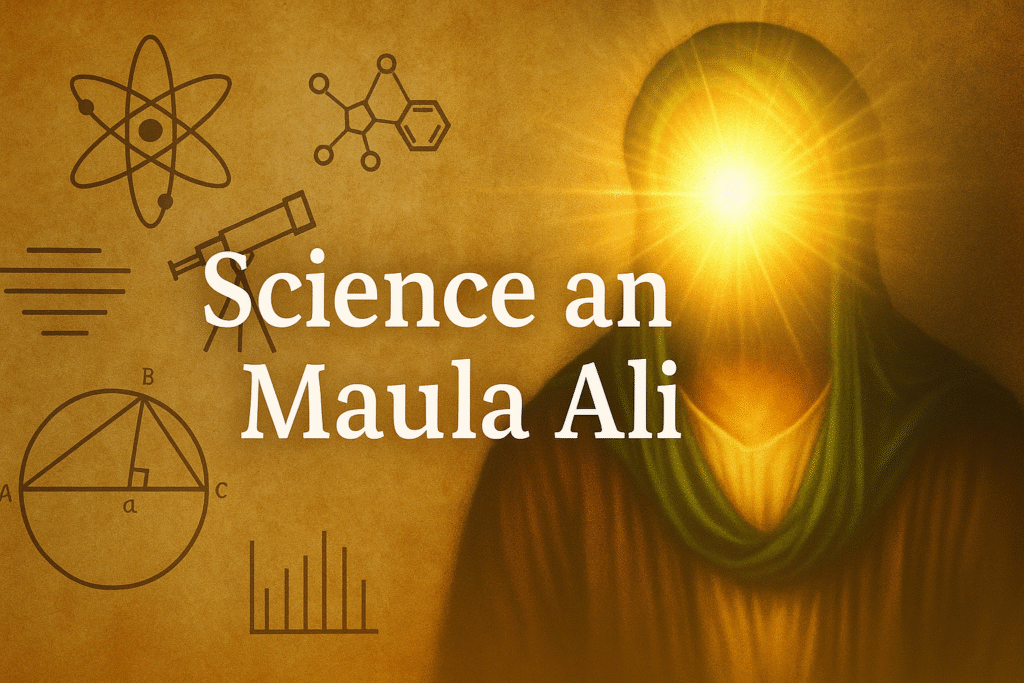Introduction: A Timeless Intellectual Light
Imam Ali ibn Abi Talib (a.s), the cousin and son-in-law of Prophet Muhammad (PBUH), is one of the most revered figures in Islamic history. Known for his unmatched eloquence, deep spirituality, and profound wisdom, he holds a special place in the hearts of Muslims, particularly in the Shia tradition. But beyond his religious and moral legacy, Imam Ali (a.s) is also remembered as a pioneer of intellect and knowledge—a figure whose insights continue to resonate with those who seek truth, reason, and understanding.
In today’s world, where science and rational thought shape much of our daily lives, many may wonder how figures from centuries ago relate to these modern values. Imam Ali (a.s) stands as a timeless example of how faith and reason can walk hand-in-hand. His teachings inspire curiosity, intellectual development, and a profound respect for learning, core principles shared with the scientific mindset.
This article explores how Imam Ali’s (a.s) wisdom aligns with the principles of science, logic, and inquiry. Whether you’re a believer or a seeker of knowledge, the timeless intellect of Moula Ali (a.s) offers valuable insights for all.
The Knowledge Legacy of Imam Ali (a.s)
Imam Ali (a.s) is famously known as the “Gate of Knowledge.” This title, attributed to him by Prophet Muhammad (PBUH), reflects his immense intellectual stature and understanding. His sermons, letters, and sayings—compiled in works like Nahjul Balagha—demonstrate a mastery of subjects ranging from theology and ethics to governance, philosophy, and metaphysics.
“The value of a person is in what he knows.”
This powerful quote encapsulates Imam Ali’s (a.s) view on the importance of knowledge. He saw learning not only as a way to gain power or success but as a means to spiritual and moral refinement. His emphasis on learning, reflection, and critical thinking paved the way for generations of scholars in the Islamic world.
Curiosity, Logic, and Reason in His Teachings
Imam Ali (a.s) was a firm advocate for reasoning and independent thinking. He frequently encouraged people to ask questions, reflect on their surroundings, and use their minds as tools for uncovering truth.
“Do not be a slave to others when Allah has created you free.”
This quote reflects both a spiritual and intellectual call to liberation. It suggests that blind imitation, whether in thought or practice, contradicts the dignity bestowed upon humans by their Creator. Imam Ali (a.s) believed that true freedom lies in using one’s intellect.
His method of approaching truth—questioning, observing, and drawing conclusions—closely mirrors the scientific method used today. In his view, knowledge was not meant to be static or inherited without reflection. Instead, it was a dynamic force to be explored and expanded.
Wisdom in Nature: Imam Ali’s Observations
Imam Ali (a.s) often spoke about the natural world with deep insight and reverence. He encouraged reflection on the stars, the sky, the earth, water, and the human body—not merely as physical phenomena, but as signs of a greater truth.
“Look at the ant with its delicate body and tiny form. It creeps on the earth and picks up grain with its mouth. It stores it in its hole and gathers it in its livelihood.”
This level of observation speaks to a mind trained in awareness and wonder. Imam Ali’s (a.s) detailed commentary on the cosmos and living beings reflects what we now call scientific observation. He saw every part of creation as an opportunity to learn and connect with the divine order.
Modern science often begins with wonder—a spark that drives curiosity and leads to discovery. Imam Ali’s (a.s) perspective on nature aligns with this spirit. His observations on human anatomy, astronomy, and ecology are not only spiritually rich but intellectually stimulating.
The Role of Intellect in Faith
In Imam Ali’s (a.s) worldview, intellect (‘Aql) is central to the human experience. He considered reason to be a divine gift that separates humans from other creatures and enables them to navigate both spiritual and worldly matters.
“The intellect is a king and characteristics are its subjects. If it is weak in governing them, disorder takes place.”
He did not see a conflict between faith and reason. On the contrary, he taught that true belief must be based on understanding. Islam, in his teachings, is not a religion of blind faith but one that values reflection and conscious choice.
This harmonization of faith and intellect has inspired generations of Muslim scholars, scientists, and philosophers. From early Islamic medicine to algebra, the legacy of reason encouraged by figures like Imam Ali (a.s) laid the foundation for the Golden Age of Islamic Science.
Imam Ali (a.s) and the Culture of Learning
Imam Ali (a.s) valued education immensely and encouraged others to seek knowledge throughout their lives.
“Knowledge enlivens the soul.”
He believed that learning was not merely an academic pursuit but a spiritual journey. He taught that humility in learning, respect for scholars, and the constant pursuit of truth were signs of a noble character.
In a time when formal education was limited, Imam Ali (a.s) cultivated a culture of learning. His support for libraries, scholars, and debates helped shape early Islamic civilization as one that prized intellect and knowledge.
Quotes from Imam Ali (a.s) That Reflect Scientific Thinking
Here are some quotes that illustrate Imam Ali’s (a.s) alignment with scientific principles:
- Observation: He who has insight sees, and he who lacks it stumbles.
- Thoughtfulness: Contemplation invites you to good actions.
- Curiosity: Knowledge is better than wealth. It guards you, while you guard wealth.
- Rational Decisions: The worst of opinions is that which is based on illusion.
- Self-Reflection: He who knows himself, knows his Lord.
Each of these quotes invites readers to think, question, and explore—the very traits valued in both science and spirituality.


